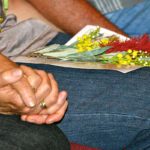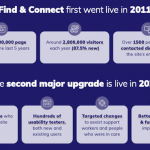On 16 November 2009, Prime Minister Kevin Rudd made the National Apology to Forgotten Australians & Former Child Migrants. You can see more about the apology and read the transcript here: https://www.findandconnect.gov.au/ref/australia/biogs/FE00081b.htm
The Minister for Families and Social Services, Anne Ruston, made a statement in the Senate to commemorate the 10th Anniversary of the National Apology, followed by a statement by Senator Siewert. You can watch it here, from 11:54:00 http://parlview.aph.gov.au/mediaPlayer.php?videoID=479993&operation_mode=parlview
More than half a million children were taken from their families between 1920 and 1989, and around 7000 arrived in Australia through child migration schemes. These children were placed into care, where many suffered abuse and neglect. Whilst some children were cared for in homes, and some enjoyed their time in care, their wellbeing was under threat by the system that was responsible for them. The child welfare system “was poorly resourced, the staff lacked appropriate training and government supervision was totally inadequate. The system was fundamentally unsafe”
The establishment of Find and Connect was first announced in the Apology.
“Many Forgotten Australians and child migrants continue to need help in tracing their families. That is why we’ll be providing a National Find and Connect Service that will provide Australia-wide coordinated family tracing and support services for care leavers to locate personal and family history files and the reunite with members of their families, where that is possible. The service will provide a national database that will collate and index existing state identified records into a national searchable data base, accessible to state and other care leaver services and also directly to care leavers themselves.”

Perth’s Sunday Times, 1939
The Find & Connect site first went live in 2011. It has since grown to be a comprehensive history of child welfare in Australia, and is unique in the world. Over 100 000 people have used the site to access support through the state and territory based services, where they’ve been assisted to trace their family, locate and access any available records, and to cope with what happened to them as children.
Others have contacted us with their own recollections and knowledge of institutions, which has allowed us to ensure that the voice of those who spent time in care is central to the history recorded on the Find & Connect site.
Where those who spent time in care as children want to recognise the anniversary, an event has been organised by the local Find & Connect support service. You can see them here: https://www.findandconnect.gov.au/2019/11/10th-anniversary-of-the-national-apology-events/
Find and Connect continues to update and improve the information on the site, both through feedback from people who were in care, and ongoing research. The Records Access Documentation Grants have also seen homes previously unknown to us added to the site; hundreds of records have been updated and made faster and easier to access by the organisations that hold them. Our ongoing collaboration with people who spent time in care has most recently results in the Map of Children’s Homes, which works with people’s memories of where they were to pinpoint the exact homes they spent time as children.
If you spent time in care as a child before 1990, you can find support here: https://www.findandconnect.gov.au/contact/
For more on Find & Connect, the following blog posts cover:
The Map of Children’s Homes:
https://www.findandconnect.gov.au/2019/10/map-of-childrens-homes
What Records Mean to People Who Were in Care:
https://www.findandconnect.gov.au/2019/06/records-files-or-the-fabric-of-life
And a more general background of the project:
https://www.findandconnect.gov.au/2018/09/helping-care-leavers-find-and-connect-to-their-past





